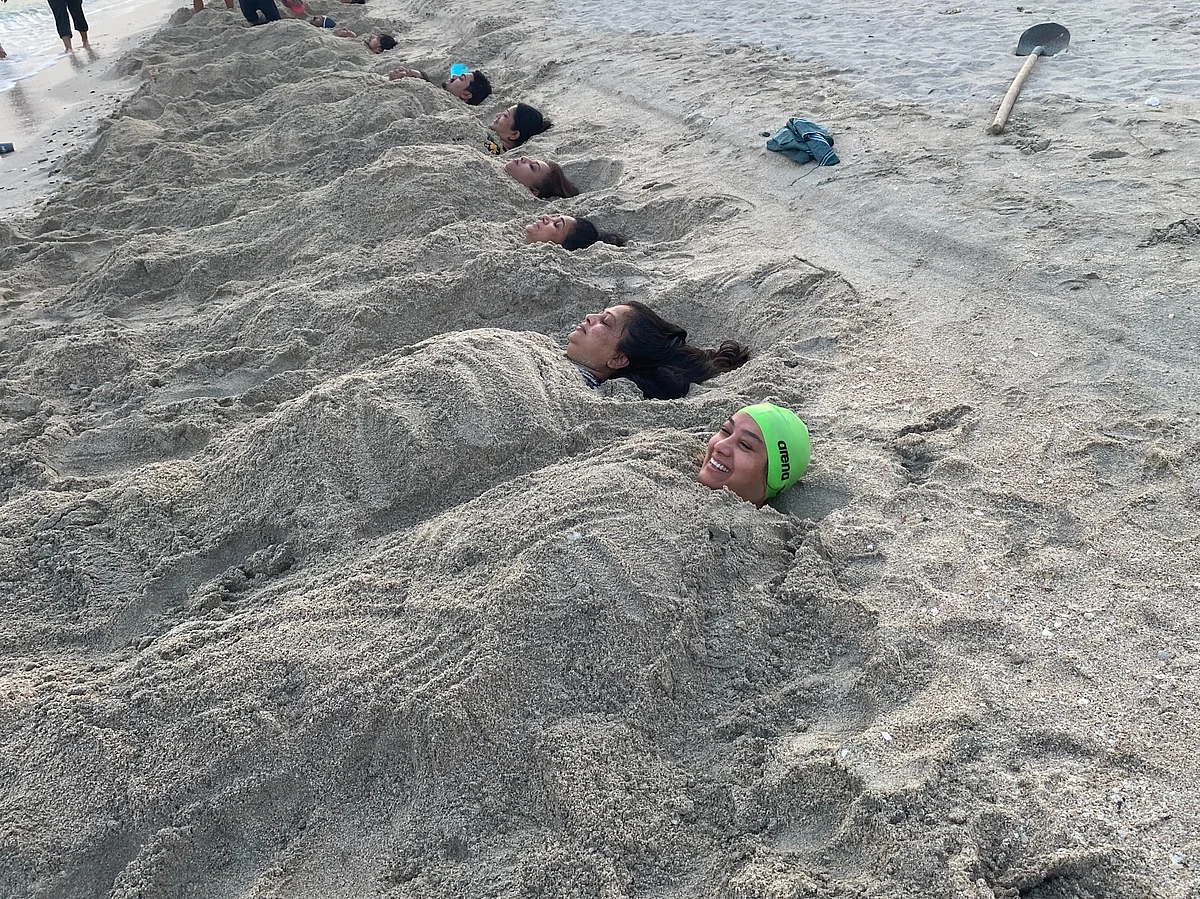Watch: Why these UAE residents get buried neck-deep in sand before sunrise
Mud baths at a Sharjah beach spark curiosity and wellness claims, but are they safe?

Sharjah: While most of the UAE is just stirring to life on a Saturday morning, a group of early risers is already up to their necks, literally, in beach sand.
At a beach in Sharjah, a cheerful bunch of Indian expats from Goa could be found once or twice a month at dawn, digging shallow pits and burying themselves with the help of friends in what they call a "mud bath"—a ritual they claim rejuvenates the body and clears the mind.
For them, this is not any quirky recreation. “It’s great for circulation and helps with aches and pains,” says Anthony Dsouza, a retired school administrator and the organiser of the sessions.
“There’s amazing energy from Mother Earth. You cannot supplement it from the pharmacy,” he adds.
Anthony, who follows naturopathy, says the group spends about 25 minutes buried in wet sand from 5.30 to 6.30 am and then washes off in the sea.
“We're not just lying around for fun. Mud therapy encourages blood flow, helps arthritic joints, and relieves pain. The sea bath afterward just doubles the benefits.”
'Felt rejuvenated, positive'
Participants echo his enthusiasm. Daisy and Bonny D’Souza, a couple who recently joined in, say the experience lived up to the hype. “We felt relief from back and joint pain. We could really feel the blood flowing. It left us refreshed, and we would highly recommend it,” said Daisy.
For Vishnu, another Sharjah resident, the session the session helped heal, detoxify, and rejuvenate his body. “From the earth we came, to the earth we return—for rest, for healing, for peace. This is what I felt as the session,” he added.
But while the group swears by the benefits, are mud baths really as healing as they seem? And are they safe to do it regularly in the UAE’s hot climate?
What the doctors say
Dr Suresh Viswakumar, Specialist in Ayurvedic Medicine at Wellth Dubai, says the practice has strong roots in ancient cultures and can provide benefits for arthritis, stress, insomnia, and skin conditions.
“Mud baths can reduce joint pain and muscle inflammation, and promote better sleep by lowering cortisol levels,” he explains.
"Regarding skin, mud baths can exfoliate, repair and improve elasticity of skin. Thus, it has an anti-aging benefit and can heal acne and help in managing condition like psoriasis etc."
He also points to the mineral content of mud—magnesium, calcium, sulfur, and zinc—as therapeutic agents.
However, he cautions that mud therapy must be tailored to individual needs. “Monthly sessions are safe for general wellness, but for medical treatment, it needs to be more structured,” he says.
He warns against usage in people with active infections, cardiac issues, or skin wounds, and stresses the importance of hygienically processed mud.
Therapeutic effects
Dr Nasrullah Jakhrani, Specialist in Internal Medicine at Aster Clinic, Bur Dubai, echoes the sentiment. “There are clear therapeutic effects such as improved circulation, relief from muscle tension, and skin benefits,” he says.
However, he warns that the UAE’s peak summer heat may pose risks. “Dehydration and overheating are real concerns. Sessions must be timed carefully, and participants should hydrate before and after.”
He also flags potential infection risks if the mud is not clean. “Contaminated mud can harbour bacteria or allergens. Look for signs of proper hygiene mud and visibly clean surroundings,” he advises. Children and the elderly should participate with caution, and individuals with chronic respiratory or skin conditions must consult a doctor beforehand.
More than sand
Despite the cautionary notes, both doctors agree that when done responsibly, mud therapy can complement a healthy lifestyle.
And for Sharjah’s spirited Goan tribe, being buried neck-deep in sand before sunrise is healing, and energising. It’s about reconnecting with nature and building a community around healing, they claim.
Network Links
GN StoreDownload our app
© Al Nisr Publishing LLC 2026. All rights reserved.